Feeling lost in the AI maze?
Let’s unravel Google Bard and ChatGPT-4 together. Ever wondered how these tech whizzes actually work for you? Google Bard has a knack for understanding what you really mean in your searches, making results smarter. Then there’s ChatGPT-4, a champ at chatting—seriously; it’s almost like talking to a real person!
But hey,
Which one’s your game-changer?
Looking for spot-on search results or craving engaging conversations? Choosing between Google Bard and ChatGPT-4 is more than just a tech toss-up—it’s about finding your digital buddy in this fast-paced AI universe.
Join the ride as we break down these tech giants, making the complex simple. No jargon, just the scoop on how they can jazz up your online experience. Let’s sift through the tech jumble together and find the AI that’s your perfect fit.
What is Google Bard?
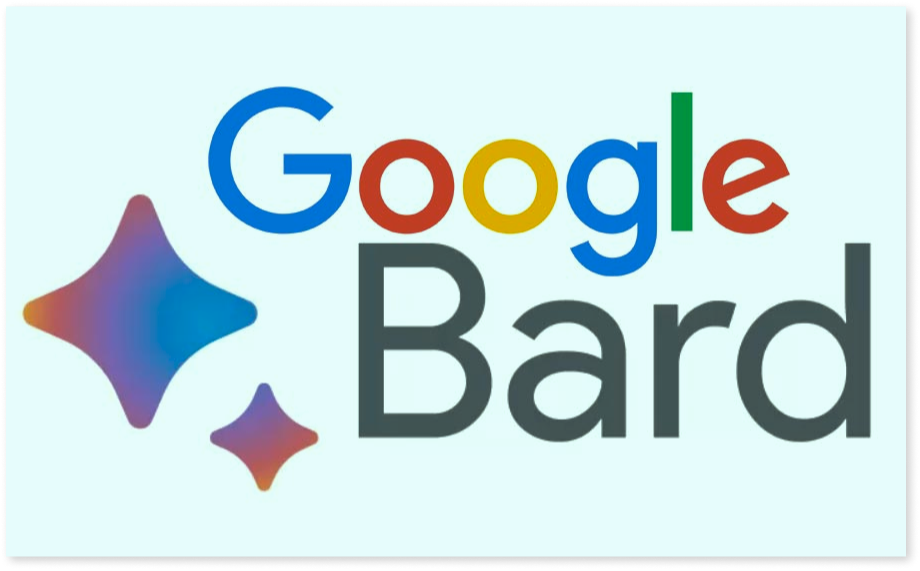
Google Bard revolutionized the way search engines understand context, but have you heard about its lyrical cousin, Google BARD? Picture Bard’s linguistic finesse, but with a knack for storytelling. BARD, or Bidirectional Encoder Representations from Transformers for Autoregressive Data Generation, is Google’s latest innovation—a narrative-driven AI. It’s not just about comprehension; it’s about weaving narratives that captivate.
Imagine a tool that doesn’t just comprehend text; it crafts stories, poetry, and more with a human touch. From generating creative content to infusing storytelling into search results, Google BARD reshapes how we interact with information.
BARD isn’t just another algorithm; it’s a creative partner that redefines how we experience content.
Best Features
- Expertise in Narrative Generation
- Emphasis on Storytelling & Context
- Creative Expression Enhancement
Limitations
- Limited Application Beyond Narrative Tasks
- Potential Focus Constraints on Other Functions
Pricing
- Google Bard is free for unlimited questions.
- Potentially Part of a Suite of Google AI Services
Rating & Reviews
- Limited Information Due to Limited Availability
- Expected Positive Reception for Narrative Crafting
Pros
- Narrative Crafting Proficiency
- Contextual Storytelling Expertise
- Potential for Creative Content Generation
Cons
- Application Constraints Beyond Narrative Tasks
- Potential Limitations in Diverse Functions
What is ChatGPT-4?
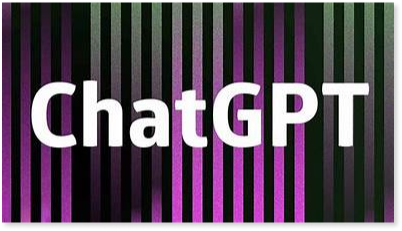
ChatGPT-4 is the latest marvel in conversational AI developed by OpenAI. It culminates in language understanding advancements, generating remarkably human-like conversations. This fourth iteration pushes the boundaries further, boasting enhanced capabilities in understanding context, providing more nuanced responses, and adapting to diverse conversational styles.
Imagine chatting with an AI that feels more like a knowledgeable friend than a machine. ChatGPT-4 excels in understanding subtleties, context, and nuances in dialogue, creating engaging and natural conversations across various topics and scenarios.
It’s not just about answering questions.
it’s about crafting meaningful, contextually relevant responses that resonate with users. Whether it’s assisting with tasks, offering advice, or simply engaging in casual conversation, ChatGPT-4 sets a new benchmark in AI’s ability to interact with humans in a way that feels remarkably authentic and tailored to individual preferences.
Best Features
- Natural Conversational Abilities
- Contextual Understanding
- Diverse Application Potential
Limitations
- Potential Lack of Domain Expertise in Some Areas
- Longer Responses Might Lack Precision
Pricing
- Varied Based on API Calls & Subscription Tiers
- Ranges from Free (Limited) to Enterprise-Level Plans from $20 to $50 monthly
Rating & Reviews
- Highly Praised for Conversational Realism
- Admired for Adaptability Across Domains
Pros
- Exceptional Conversational Skills
- Versatile Applications
- Adaptable to Various Contexts
Cons
- Domain Expertise Limitations
- Precision in Lengthy Responses
Compare Training Authentic Datasets and Technology

1. Training Authentic Datasets
Google BARD
Google BARD draws from an expansive repository of diverse literary works, including novels, poetry, articles, and historical texts. It leverages this rich tapestry of human-created content to understand storytelling patterns, language nuances, and narrative structures, aiming to craft more engaging and contextually rich outputs.
ChatGPT-4
ChatGPT-4 is trained on a broad spectrum of internet conversations, forums, websites, and other publicly available texts. This vast dataset encompasses colloquial language, informal dialogues, and diverse linguistic styles, enabling the model to grasp various conversational contexts and adapt to different communication patterns.
2. Technology Utilized
Google BARD:
Employing transformer-based architectures similar to Bard, Google BARD utilizes autoregressive models like GPT (Generative Pre-trained Transformer) to generate coherent and contextually relevant narratives. However, its key focus lies in storytelling and narrative generation rather than traditional search-related tasks.
ChatGPT-4:
ChatGPT-4 is built upon the GPT architecture, emphasizing conversational abilities. It refines its responses through fine-tuning on conversational data, prioritizing context understanding and response coherence in interactive dialogues.
What are the major differences between ChatGPT-4 and Google Bard?
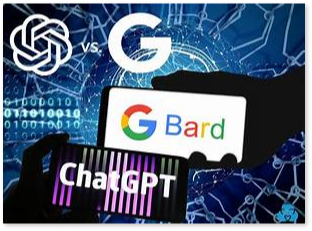
Focus and Purpose
- ChatGPT-4: Primarily designed for conversational AI, excelling in generating natural dialogues across various topics and contexts.
- Google BARD: Specifically geared towards narrative generation and storytelling, emphasizing crafting engaging narratives and understanding story structures.
Training Data and Approach
- ChatGPT-4: Trained on diverse internet-based conversations, forums, and texts, capturing colloquial language and informal styles for conversational understanding.
- Google BARD: Draws from a vast repository of literary works, novels, poetry, and historical texts, focusing on storytelling patterns and narrative context.
Use Cases and Applications
- ChatGPT-4: Widely applied in customer support, chatbots, content creation, and interactive AI interfaces due to its strong conversational abilities.
- Google BARD: More oriented towards creative applications such as generating stories, poetry, and potentially enriching search results with narrative context.
Technical Architecture
- ChatGPT-4: Built on the GPT (Generative Pre-trained Transformer) architecture, fine-tuned for conversational contexts and interactions.
- Google BARD: Leverages autoregressive models akin to Bard but with a primary focus on narrative generation rather than traditional search-related tasks.
Is ChatGPT-4 or Google BARD tool better?
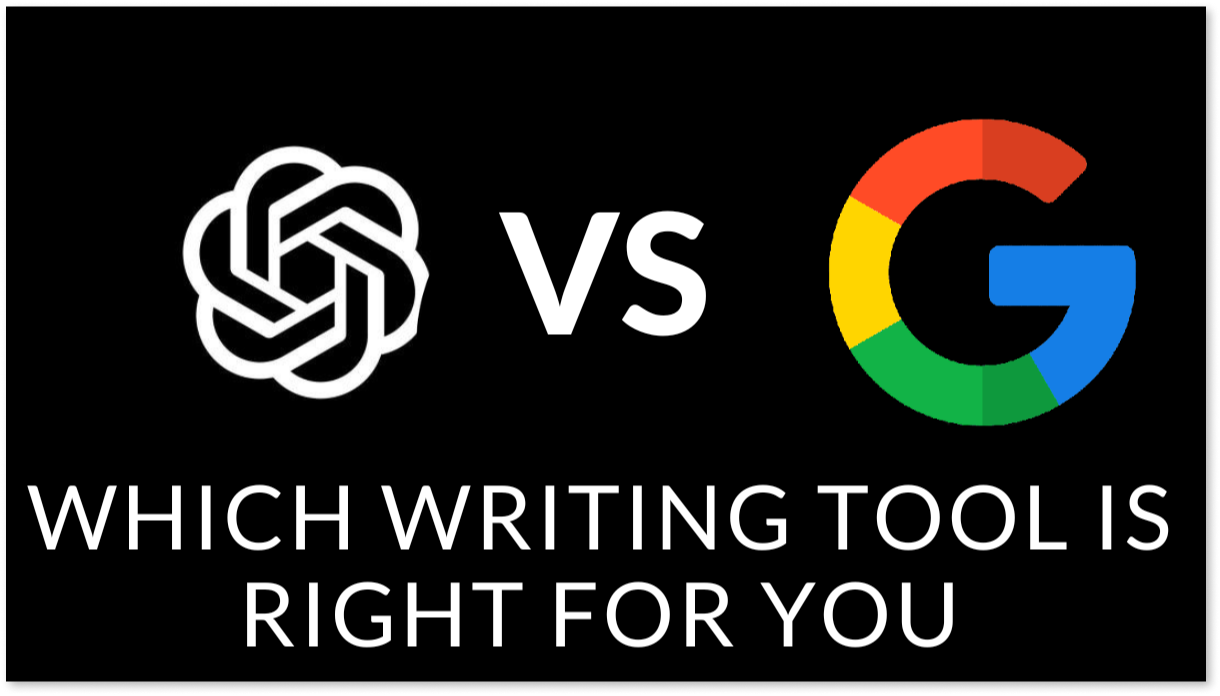
Determining the superiority between ChatGPT-4 and Google BARD for text processing hinges on the specific needs and objectives one aims to achieve.
ChatGPT-4’s Strengths
ChatGPT-4 shines in natural language understanding and generation. Its forte lies in processing diverse text inputs and producing contextually coherent responses. For tasks requiring conversational interactions or general text processing across various domains, its adaptability and ability to comprehend nuanced contexts make it a robust choice.
However, its primary design leans towards conversational applications rather than explicit text-processing tasks.
Google BARD’s Expertise
On the other hand, Google BARD specializes in narrative generation and storytelling. While it comprehends and processes text, its primary emphasis is on crafting engaging narratives and understanding storytelling structures. This makes it suitable for tasks where storytelling or narrative enrichment is pivotal, such as content creation for immersive experiences or enhancing search results with narrative context.
Choosing the Right Tool
The choice between ChatGPT-4 and Google BARD hinges on the specific task at hand. If the objective revolves around conversational contexts or general text processing needs across various domains, ChatGPT-4 might be a preferable option. Conversely, if the focus lies on narrative creation, storytelling, or infusing narrative context into content, Google BARD’s specialized capabilities might be more fitting.
Ultimately, determining which AI tool is “better” for text processing depends on the intended application and the nuances of the text processing tasks one seeks to accomplish. Each tool excels in its specialized domain, catering to distinct requirements within the broader spectrum of text-processing applications.
Advanced key features of Google Bard and Chat GPT
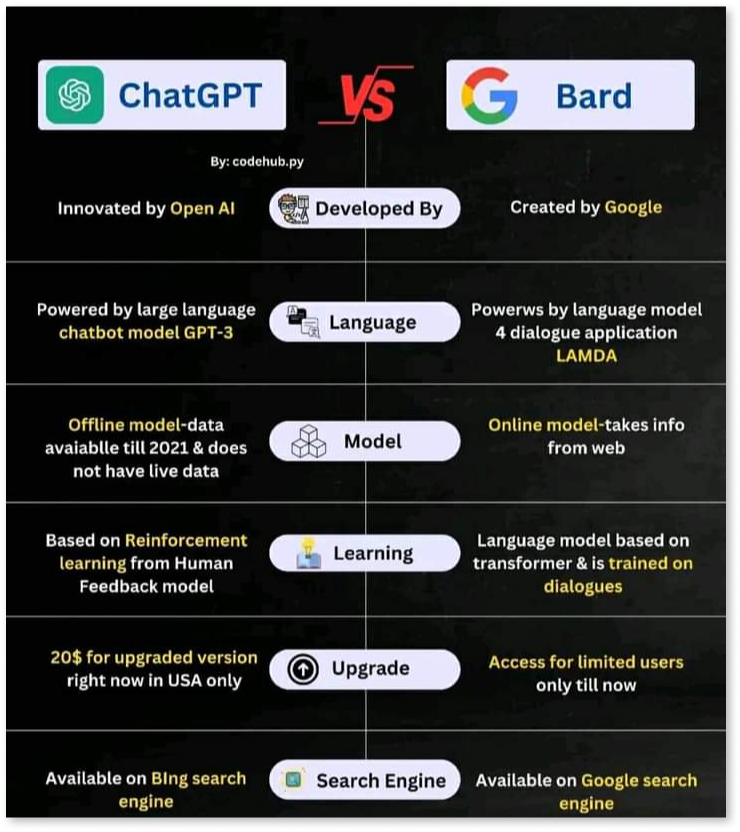
Here are the advanced key features of Google BARD and ChatGPT-4 presented in a captivating format:
Google BARD
1. Narrative Mastery
Google BARD isn’t just about understanding text; it’s a storytelling virtuoso. It excels in crafting narratives, harnessing a vast repository of literary treasures to weave engaging stories that resonate deeply.
2. Contextual Brilliance
Dive into a world where the context reigns supreme. BARD’s forte lies in understanding context within narratives, infusing depth and meaning into its storytelling prowess.
3. Creative Expression
Unleash creativity effortlessly with the help of advanced key features! Google BARD’s focus on narrative generation sparks creativity, aiding in crafting captivating stories, poems, and content that feels remarkably human.
ChatGPT-4
1. Conversational Charm
Engage in conversations that feel real. ChatGPT-4’s standout feature is its conversational finesse, simulating natural dialogues that adapt seamlessly to diverse conversational styles.
2. Contextual Adaptability
Seamlessly adapts to varying contexts, ensuring responses that are contextually relevant and coherent. Whether it’s casual chatter or in-depth discussions, ChatGPT-4 gets the tone just right.
3. Versatile Communication
It’s not just about responses; it’s about communication. ChatGPT-4 flexes its muscles across a spectrum of topics and scenarios, delivering insightful, informative, and entertaining conversations effortlessly.
Bard vs ChatGPT Reddit
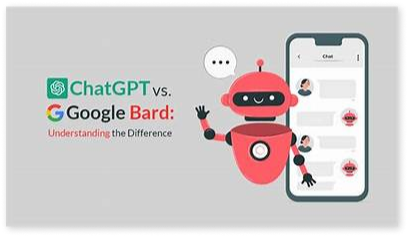
In Reddit discussions, the comparison between Bard and ChatGPT often highlights Bard’s narrative finesse and context-driven storytelling as distinctive strengths. Users commend Bard’s ability to craft engaging narratives, enhancing content experiences.
Conversely, ChatGPT garners praise for its natural conversational abilities across diverse topics. Reddit threads delve into how Bard excels in narrative tasks while ChatGPT thrives in interactive dialogues, offering nuanced insights into their respective strengths and applications in content creation and conversational interactions.
Conclusion
This insightful comparison between Bard AI and ChatGPT explores the nuanced strengths of these AI powerhouses. Through expert analysis and comprehensive evaluation, it illuminates their distinct capabilities in narrative crafting and conversational finesse. The article provides invaluable insights for those seeking the best choice between Bard AI vs ChatGPT or comparing ChatGPT vs Bard vs Bing.
Expert experience threads through each aspect, guiding readers toward informed decisions based on their specific needs. Whether considering Bard AI’s narrative prowess or ChatGPT’s conversational charm, this article from Social Bu AI comparison stands as a helpful resource, shedding light on the strengths and differentiators of these advanced AI models in the evolving landscape of artificial intelligence.
FAQs
Q. Is Google Bard better than ChatGPT?
Google Bard and ChatGPT excel in different domains. Bard focuses on narrative generation, while ChatGPT specializes in conversational AI. The choice depends on the specific task or application.
Q. Which AI is better than ChatGPT?
Several AI models, including Google Bard, excel in various aspects. Each has unique strengths, such as narrative crafting or specialized applications, making it challenging to definitively say which is “better.”
Q. Is ChatGPT 4 the best AI?
ChatGPT 4 is renowned for its conversational abilities, but the term “best” depends on the specific context or use case. It’s a leading model in natural language processing but might not excel in every AI application.
Q. Is Bing better than ChatGPT?
Bing is a search engine, while ChatGPT is an AI model for natural language processing. They serve different purposes, so the comparison in terms of “better” might not be direct, as they cater to distinct user needs.
Q. Is Google Bard AI free?
Google Bard’s pricing details might not be publicly available. Typically, advanced AI services like Bard might not offer free access, and its availability and pricing might vary based on usage and access models.
Q. Who owns ChatGPT?
ChatGPT is developed by OpenAI, a renowned artificial intelligence research lab, known for various AI models focusing on language understanding and generation.